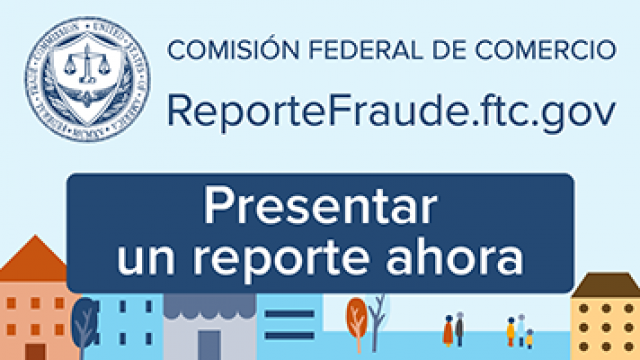Learn about the latest scams, and get advice to help you avoid, report, and recover from them.
Displaying 121 - 140 of 644
Consumer Alert
July is Military Consumer Month, so we’re deploying advice you can use. No matter what stage of military life you’re going through, you could encounter an imposter scam: someone pretending to be your bank’s fraud department, the government, a relative in distress, a well-known business, or a technical support expert. Want to protect yourself and the people you care about? Let the FTC help.
Consumer Alert
When you want to know what’s happening in housing, you go to the experts. That’s why the FTC joined renters, renters’ advocates, and researchers in Atlanta to hear about issues affecting renters. They told us that the rise of institutional investors and corporate landlords since the financial crisis has contributed to rising rents, hidden junk fees, issues with online portals, and predatory lease-to-own schemes. Here are some takeaways from housing advocates and renters.
Consumer Alert
Wondering if you need an international license to drive in a country you’re visiting? Every country has its own rules for visitors who want to drive. In some, like Canada, your U.S. driver’s license is all you need. Other countries require you to get an International Driver’s Permit (IDP). Scammers try to confuse you with fake IDPs and websites that not only take your money and give you nothing but can also cause you trouble abroad.
Consumer Alert
Here’s a new scam spotted on social media: appointment setting jobs. They claim you can work from home and make big money. But just what does an appointment setter do? And how can you tell the difference between a legit job offer and a scam?
Consumer Alert
Maybe you want to try out a product for a little while before you make a long-term decision. So, you sign up for a monthly subscription plan. Everything is fine until you want to cancel and it turns out to be a yearly subscription with monthly payments. Surprise! That’s what the FTC says happened to people who signed up for monthly subscriptions with Adobe.
Consumer Alert
Scammers pretending to be from the government tell convincing stories to steal your money or personal information. But now they’re taking a new, layered approach — and here are some clues to spot it.
Consumer Alert
No one thinks their online love interest is going to scam them, but scammers are good at what they do. They establish an emotional connection with you so you’re more likely to believe that they’re an expert in cryptocurrency investing, for example. But that online love interest is a scammer. People have lost tens of thousands ― sometimes millions — of dollars to romance scammers.
Consumer Alert
Weather forecasters are predicting an active hurricane season, but if you live in large parts of the country — including those hit by tornadoes over Memorial Day Weekend — you’ve probably noticed more active storms of all types. To get started preparing for hurricane season or any storm, while avoiding scams, check ftc.gov/WeatherEmergencies for new information to help you spot, avoid, and report scams as you prepare for, deal with, and recover from extreme weather and natural disasters.
Consumer Alert
The phone rings. Your caller ID says it’s the Social Security Administration. You hesitate. You’re not expecting a call from them, and you’ve heard about impersonation scams. But something inside you makes you pick up. And everything you’re about to hear is designed to scare you into doing whatever the caller says.
Consumer Alert
When you go through a toll, you know you’ll need to pay a fee to use that road or bridge. But scammers are targeting drivers with text messages pretending to be from the tolling agency collecting “overdue toll charges.” Here’s what to know about this text scam.
Consumer Alert
Another day, another round of spam texts and emails trying to sell you things. At best, spam is annoying. At worst, it’s pushing scams or trying to install malware on your device. If you’re tired of getting spam, there are some ways to help.
Consumer Alert
Just as people in Nebraska, Iowa, Oklahoma, and other Midwestern states are reeling from the catastrophic damage caused by tornadoes and other severe weather, scammers are rolling in. They use all kinds of stories to try to trick not just those doing their best to recover, but also anyone who tries to help. The best way to steer clear of these disaster-chasing scammers? Know what their tactics have in common.
Consumer Alert
If you’re paying a medical, utility, or other bill online, you probably expect to wind up on the company’s website. What might you not expect? An impersonator tricking you into paying them instead. But that’s what the FTC says a company called Doxo did. Here’s what you need to know.
Consumer Alert
Are you having a hard time paying your mortgage? Even if you’ve missed payments or you’re already facing foreclosure, you still might have options. You really do, but that’s the same thing scammers will tell you. Fortunately, there are ways to spot mortgage relief scams while you focus on saving your home.
Consumer Alert
If you’re looking for a new job, getting paid to shop might sound like a dream. Companies hire mystery shoppers to try products or services and share experiences about things like buying or returning something, or their overall customer experience. But while some mystery shopping jobs are legitimate, many aren’t. So how do you spot the scams?
Consumer Alert
Hearing a lot about federal student loan forgiveness in the news? You’re not alone — scammers are, too. You might get a call from someone saying they’re affiliated with Federal Student Aid (FSA) or the Department of Education. (They’re not.) They’ll say they’re following up on your eligibility for a new loan forgiveness program, and might even know things about your loan, like the balance or your account number. They’ll try to rush you into acting by saying the program is available for a limited time. But this is all a scam. What else do you need to know to spot scams like this?
Consumer Alert
Thinking about applying for a job with the United States Postal Service (USPS)? Make sure you’re dealing with the real thing. Scammers advertise jobs that don’t actually exist to try to steal your money and personal information — and one way they do that is by pretending to be USPS. So how do you know if that postal ad or offer you get is a scam?
Consumer Alert
Sharing a scam experience with someone you know takes courage. If someone trusts you enough to share their scam story, especially if the scammer is still in touch with them, here’s some advice to help guide you.
Consumer Alert
Getting hired might feel like the ultimate high. But finding out it was just a scammer trying to steal your money will bring you — and your bank balance — right back down. Many college students look for virtual jobs they can do while going to school, but if a new employer mails your first paycheck before you even start working, that’s your cue to stop — it’s a scam.
Consumer Alert
If a call sounds like your boss (asking for bank account numbers) or your family member (begging for help in an emergency), you’re more likely to act. That’s why scammers use voice cloning to make their requests for money or information more believable. And the FTC is fighting back.
Displaying 121 - 140 of 644



